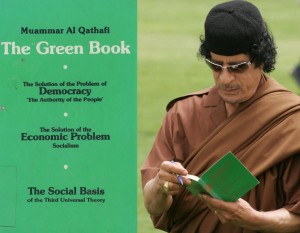 It seems like everyone has something to say about the nature of women and the meaning of menstruation. Even Col. Muammar el-Qaddafi, the recently deposed and still at large dictator of Libya, took it upon himself to opine on the topic. I am not able to judge the accuracy of the translations I have read since so many of those who write about Qaddafi find it hard to resist taking shots at his many peculiar characteristics, but here’s an excerpt from his magnum opus, The Green Book, a three-volume manifesto covering a wide range of subjects, including the nature of men and women, education, politics and the Libyan constitution. The translation comes from a site called Kawther Salam.
It seems like everyone has something to say about the nature of women and the meaning of menstruation. Even Col. Muammar el-Qaddafi, the recently deposed and still at large dictator of Libya, took it upon himself to opine on the topic. I am not able to judge the accuracy of the translations I have read since so many of those who write about Qaddafi find it hard to resist taking shots at his many peculiar characteristics, but here’s an excerpt from his magnum opus, The Green Book, a three-volume manifesto covering a wide range of subjects, including the nature of men and women, education, politics and the Libyan constitution. The translation comes from a site called Kawther Salam.
“Female is women, and male is man. And women according to the saying of gynecologists, “She menstruates or becomes ill each month, and men do not menstruate because they are male, man does not get sick monthly with “period”. This periodic disease means, every month there is bleeding so the woman because she is female is under a natural monthly disease of bleeding. And when the woman does not menstruate she becomes pregnant . . . and man does not become pregnant and therefore is not naturally affected with these diseases which infect women, because of being females. A woman after that gives breastfeeding to the child… the natural breastfeeding is two years. Therefore breastfeeding means that the woman accompanies her child and her child accompanies her, therefore her activities are paralyzed and she is directly responsible for another human being whom she helps in all biological functions, and without her he dies, and men do not become pregnant and give breastfeeding.”
In light of the starkly negative view of women and menstruation implicit in this passage (presuming the translation accurately captures the tone), it will be interesting to see how the newly emerging political and social structures in Libya frame the menstrual ecology of the country. Those readers familiar with menstrual values and practices in countries and cultures like Libya are encouraged to comment so as to enrich our understanding.

